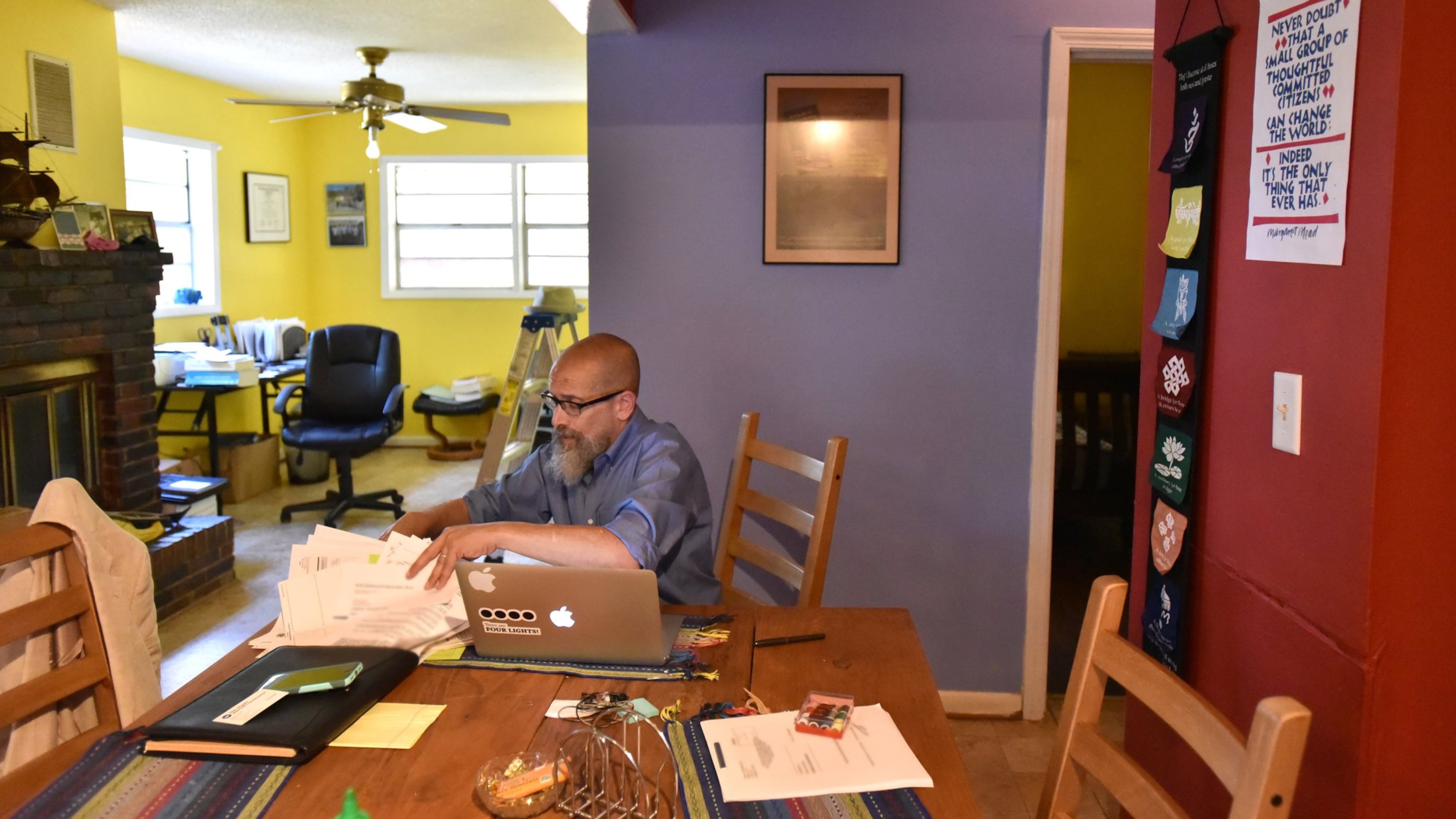Immigration lawyer finds home in shadow of giant Ga. detention center

LUMPKIN — Just outside this sleepy southwest Georgia city sits Stewart Detention Center, a sprawling red and gray complex rimmed with barbed wire. The largest immigration detention center east of the Mississippi River with room for 1,900 detainees, it has locked up people from more than 140 countries and nearly every continent.
Yet there is just one immigration attorney permanently based in this isolated part of the state some 140 miles south of Atlanta: Marty Rosenbluth, a 60-year-old former trade union organizer from New York City who bought a little white house here last year.
There is no shortage of work, nor is the work easy. The backlog of federal immigration court cases tops a million nationwide and the judges in Lumpkin deny more than 90 percent of the asylum requests they hear, according to one study.
Rosenbluth feels nervous every time he passes through Stewart’s rattling gates and into the small immigration court inside, where he represents people who say they are fleeing persecution. Bookish and bespectacled, he got a phoenix and a dragon tattooed on his back to feel stronger.
“This type of work is not something you do. It has to be somebody you are,” said Rosenbluth, who earlier did human rights work in the occupied West Bank and represented Syrian refugees in Greece.
More: Inspectors find drugs, dangers in Ga. ‘ticking bomb’ detention center
Defendants in federal immigration courts have a right to an attorney but at their own expense. Their chances of winning relief increase dramatically when they get lawyers, according to Syracuse University’s Transactional Records Access Clearinghouse, a research group that monitors the federal government. Nationwide, 20 percent of those with attorneys were ordered deported compared to 76 percent without them, according to TRAC figures through September. At Stewart, just 12 percent of detainees have been represented.

Much of Rosenbluth’s work involves probing immigration law — which rivals the federal tax code in its complexity — for ways to free his clients on bond. He interviews his clients extensively, digs into their backgrounds, talks to their relatives and studies conditions in their native countries. His court filings can reach into the hundreds of pages. His work concludes at procedural court hearings that can be over within minutes, though some can last hours. His clients can be locked up for months at Stewart while their cases wind their way through the court. In the end, he said, most of them lose their cases.
Not Trump country
Rosenbluth is doing his lonely work here at a time of heated rhetoric surrounding asylum seekers. President Donald Trump stoked anti-immigrant sentiment ahead of the midterm congressional elections this month when he issued dire warnings about a caravan of migrants approaching from Central America and then by deploying thousands of troops to the southwest border. A majority of Americans say the caravan poses at least a minor threat to the United States, according to a Monmouth University poll in November, while 70 percent of those surveyed said the migrants should be allowed to enter if they meet certain requirements.
Bordering Alabama, Stewart County is not Trump country. Hillary Clinton won 59 percent of the vote here in the 2016 presidential election. The county is home to just 5,900 people, more than a third of whom live in poverty. The nearest sizable grocery store is the Piggly Wiggly, eight miles away in Richland.
Stewart County Manager Mac Moye previously worked as a case manager in the immigration detention center in Lumpkin. The county’s largest employer, the facility is operated by CoreCivic, a Nashville-based corrections company. Moye doesn’t see a conflict between Rosenbluth’s work and the county’s interests.
“As far as I am concerned, if somebody should be deported, they should be deported,” Moye said. “If they shouldn’t be deported, they shouldn’t be. I am happy for the people who have a right to be in this country to be here.”
Rosenbluth represents 10 to 15 immigrants at a time, some for free. He works for Polanco Law, a Raleigh, N.C.-based firm that specializes in immigration, criminal and family law cases.

“As soon as word got out in North Carolina and elsewhere that my firm had a presence down there, things just exploded,” said Rosenbluth, who graduated from law school at the age of 50 and speaks Spanish and Arabic.
When Rosenbluth started representing people here in 2010, he would drive about 500 miles each way from his home in Hillsborough, N.C. And he would stay in a hotel in Columbus — 40 minutes north of Lumpkin — for more than a $100 a night. He later spotted a house for sale a minute’s drive from the detention center with the mortgage payment advertised at under $100 a month. He snapped it up and rents one of his rooms to fellow immigration attorneys visiting from out of town. In his backyard sits a mobile home, where pro bono immigration attorneys for the Southern Poverty Law Center are living temporarily.
Rosenbluth has a large dry erase planner hanging on the wall in his home office, filled with color-coded notes tracking his complicated cases. He relieves stress by playing with his rescue dogs Wags and Salsa, banging on his bongo drums or baking bread. He travels home to North Carolina to see his wife four or five days every month.
A Jew, Rosenbluth said his faith motivates him after his ancestors immigrated to America from Poland and Russia to escape pogroms in Eastern Europe. Months ago, he noticed someone had scratched the word “kike,” an ethnic slur for a Jewish person, into a wooden table used by immigration attorneys in the Immigration Court in Lumpkin. The judge pledged to make it disappear.
Day in court
Rosenbluth recently visited the court to represent a man with a one-year-old daughter born in America, one of 33 immigration cases on the docket that day. Most of the immigrants didn’t have attorneys and if they did, their attorneys would be calling in by phone. Being there in person is more effective, Rosenbluth said, because he can see the body language of his clients and the judges. He said being there also boosts his clients’ spirits during some of the most difficult moments of their lives.
Several nervous-looking detainees in orange, blue and tan uniforms with slip-on shoes sat silently behind Rosenbluth in the drab courtroom. Among them was his client, Jorge Miguel Cruz, a 26-year-old Mexican immigrant with shaggy long black hair and a quiet disposition.
Cruz’s hearing was over within minutes. Through Rosenbluth, Cruz asked the judge if he could leave the country voluntarily, on his own terms. But an attorney for U.S. Immigration and Customs Enforcement objected, pointing to Cruz’s criminal record. Rosenbluth would later discover that Cruz had been convicted of misdemeanors for larceny and possession of marijuana and drug paraphernalia. The judge scheduled another hearing for the following month and Cruz was ultimately ordered deported.
Rosenbluth has notched some victories for clients as well. Among them is Jorge Plasencia, who was released on bond recently after being held in Lumpkin for two months. Plasencia was first detained in Texas after fleeing persecution in his native Ecuador, said his sister-in-law, Tania Murillo, who lives in Elmsford, N.Y. Murillo said Rosenbluth met her brother-in-law outside the detention center once he was released and helped him make travel arrangements to reunite with his family while he pursues his asylum claim.
“From the beginning to the end he was there, not just as an attorney but as a human being who cares about another person,” she said of Rosenbluth. “We are extremely thankful to him.”



